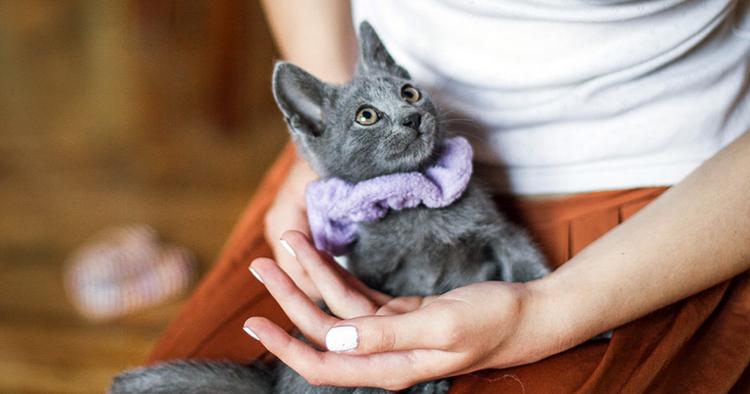Cat Personality Types: Finding Your Perfect Match
Are you wondering which type of cat will match your brand of human personality? Read on for some helpful advice.
Are you wondering which type of cat will match your brand of human personality? Read on for some helpful advice.
by Janelle Leeson, | May 21, 2024

Anna Artemenko / Stocksy
Are you considering adopting a cat and wondering which type of cat personality will be the right fit? Or have you recently adopted a kitty while re-examining your life choices, and wondering how your cat will fit into all that? You’re not alone!
This guide will help you discover how to identify your cat’s personality to better understand and nurture their individual needs. But also: It will help you identify your cat’s personality, so you are better prepared to figure out how your new furry bestie is going to fit into your lifestyle.
Cat personality types — like neurotic, extraverted, dominant, agreeable, and impulsive — are not solely dictated by coat color or even breed, despite what you may have heard. Each cat has a unique personality that has more to do with your cat’s age and life experiences, says Dr. Yui Shapard, veterinarian and educational director of the Association of Asian Veterinary Medical Professionals (AAVMP).
Cats definitely have personalities. To experience the variety of cat personalities firsthand, “Visit shelters and spend some time getting to know the cats there,” says Shapard. “Many cats can be shy. But once they warm up, their unique and playful nature is easy to detect. Potential cat parents will start to have a sense of who are the feisty ones and who are the laid-back ones.”
A significant portion of a cat's personality takes shape during the critical socialization period. This is the time, from about two to seven weeks of age, when kittens are most impressionable.
During this sensitive phase, kittens learn essential skills from their mom and siblings, like how to play and use the litter box. They also observe and mimic their mom’s temperament toward humans, and experience their first interactions with humans themselves. “If kittens have multiple positive experiences with a variety of humans, they’re more likely to enjoy human interaction and be comfortable with a variety of different people,” explains Joey Lusvardi, a Certified Cat Behavior Consultant and owner of Class Act Cats.
Negative experiences during this phase can have a big impact on their behaviors and temperament, too, says Shapard. For instance, kittens separated from their siblings too soon often develop biting habits, because they don’t learn how to properly play. Kittens who are not handled by humans before seven weeks of age may become fearful. More often than not, these kitties may be mistaken as having an aggressive personality.
Have you heard of the Big Five personality traits, also known as the Five Factor Model? It’s a sliding scale of five personality types aimed at measuring and categorizing the dimensions of human personality. Recently, scientists adapted this model to fit cats. The Feline Five identifies five types of cats: extroverted, agreeable, dominant, impulsive, and neurotic. As with humans, cats' personalities are recognized on a spectrum rather than fitting neatly into one box. In other words, your cat might be slightly neurotic, but also agreeable and sometimes impulsive.

luke + mallory leasure / Stocksy
Also known as the “cantankerous cat”
Easily spooked
May experience separation anxiety
Shy around strangers
Suspicious of objects and other pets
May excessively groom
Gets stressed out in new environments
Prefers resting under the bed or in a cubby
Being both predators and prey, all cats naturally exhibit some neurotic traits. Safe retreat spaces like boxes and cubbies are beneficial for cats, but they become even more crucial for highly neurotic ones. Neurotic cats may be best suited for single-animal or calm households with pet parents who are patient, soft-spoken, and stick to a routine.

Gillian Vann / Stocksy
Also known as the “inquisitive cat” or the “cat’s cat”
Watchful, alert, and observant of their surroundings
Eager to explore new objects and environments
Skilled at making toys out of everyday objects
Capable of solving puzzles and learning new tricks
The first to greet you or strangers at the door, often with their tail held high in a question mark shape
If this sounds like your cat, you’ll likely find them perched on high shelves, trees, or furniture keeping a watchful eye on their domain. Extraverted cats thrive with interactive play, and typically do well in active households or with other pets when properly introduced. While they can entertain themselves with just about anything (milk-carton rings make the best toys!), they appreciate the company of a sitter if you’re away for more than a long day at work.

Chelsea Victoria / Stocksy
May be known as the “hunter cat”
Asserts themselves into almost every situation
Tends to mark their territory by scratching and rubbing against objects, including their favorite humans
Attention-seeking
May bully or challenge other pets
May vocalize for attention
Is your kitty notorious for interrupting Zoom meetings to headbutt your face? If so, you might have a dominant cat who also likes sitting on your laptop. While dominant cats can live in multi-cat households, providing plenty of key resources like litter boxes, cat trees, and scratching posts help minimize territorial stress. Pet parents of dominant cats should be prepared for an extra dose of affection and potential assertive behaviors (eye contact, occupying preferred spaces, and vocalizations).

Drazen_ / iStock
Also known as the “lap cat” or the “human’s cat”
Tends to adapt well to changes in their environments and routines
Displays a laid-back and easygoing demeanor
Enjoys gentle play
Gets along well with others, including kids and other pets
Your agreeable cat sees no reason to rush through life, because there’s always time for another catnap in a sunbeam or for cuddling against their favorite furry companion or human. They're not ones to demand the biggest, most robust cat tree, but would rather gently bat at a toy mouse or swat at a cat dancer toy. Their adaptability extends to welcoming new babies and pets into the household, making them ideal choices for a cat parent seeking a companion that effortlessly blends into family life.

Amor Burakova / Stocksy
Most likely to have the midnight zoomies
Most likely to have post-litter box zoomies
Enjoys risky behaviors
May overeat or explore objects through oral taste and texture
Enjoys chasing or pouncing at other housemates
Easily becomes overstimulated or engages in rough play
To channel their explosive energy, impulsive cats benefit from safe outlets like leaping after feathered wand toys or sprinting on a cat wheel. Providing shelving for them to safely pounce between surfaces can also be enjoyable. To help your cat wind down for the night, play with them just before bedtime, ending the play session with a small snack or treat to replicate your fierce hunter catching their prey.
You’ll quickly pick up cat-personality clues by observing your cat’s everyday actions, both big and small. Pay attention to where they prefer to nap, what movements entice them to play with toys, and how they react to new stimuli. You’ll find that catering to your cat’s likes and dislikes will result in a happier feline and more peaceful household.
Unsure about the right cat for you? The American Society for the Prevention of Cruelty to Animals (ASPCA) has a quiz to help. This short questionnaire considers factors such as your activity preferences, desired cat companionship, and the time you typically spend away from home. Based on your responses, it generates a suggested cat-personality type for you. The ASPCA even emails you a copy of the questions, your answers, and the recommended cat type to bring along when you visit a shelter.
“Shelters are high-stress environments,” explains Heather Dickerson, a pet matchmaker at Austin Pets Alive!. “Sometimes their personalities don’t fully shine until they are comfortable in a home with people they feel safe with.” When that’s the case, shelter staff and volunteers can provide valuable information about a cat's personality and help match you with your preferred cat-personality type. Alternatively, ask about fostering or a foster-to-adopt program as a way to better get to know your prospective kitty in a home setting.
Sometimes. “There’s only so much that genetics can influence,” Shapard says. Some cat breeds, such as the British Shorthair, are bred for their charming looks and calm nature, she adds. However, socialization and life experiences can alter those expected cat-breed traits.
To that end, Lusvardi shares his experience working with Rragdolls. “They’re known for being one of the friendliest cats," he says. Yet he’s worked with Rragdolls with biting habits. “That doesn’t mean that they can’t be lovely pets or very sweet companions,” he says, “but you really want to know the characteristics of any individual cat before adoption.”
“Generally speaking, older cats do tend to be a lot calmer and laid-back than younger cats,” says Shapard. “In the same way that most humans mellow out as we age, so do most cats.” Lusvardi adds that exploratory behaviors, such as biting, typically begin to improve as kittens enter adulthood, since they have a better understanding of the world around them.
Spaying or neutering your cat won’t change their fundamental personality, but it effectively curbs unwanted behaviors associated with mating (including aggression, territory-marking, and excessive vocalization).
Nope, color does not affect a cat’s personality. We’re all familiar with the feline stereotypes of “orange cat behavior” and “spunky calicos.” But veterinary behaviorist Dr. Mikel Delgado debunks these theories, telling The Wildest that there is no evidence that coat color influences a cat’s personality.
If you feel like your cat is a copycat, there might be some truth to it, according to a 2019 study. The researchers delved into cat-owner parallels and discovered that pet parents with neurotic personalities often have cats exhibiting neurotic tendencies, such as anxiety, fearfulness, and overeating. Similarly, the study suggests that pet parents with extroverted personalities tend to have cats more willing to explore the outdoors.
However, it’s worth noting this study’s limitation: self-reporting. This possibly explains why agreeable humans reported higher satisfaction in their feline companions’ behaviors, while neurotic individuals reported behavioral problems in their cats. A human’s personality also impacts how their cat navigates the world, with an extrovert being more inclined to provide outdoor access for their feline friends.
Developmental Stages of Kitten Behavior
The ‘Feline Five’: An Exploration of Personality in Pet Cats
The Feline Five Is a Personality Test That Could Actually Be Useful

Janelle Leeson is a Portland, Oregon-based freelance writer. Her work has been featured in magazines such as Inside Your Dog’s Mind, Inside Your Cat’s Mind, and Paw Print, as well online at Insider Reviews, NBC Select, Shop Today, PetMD, and Daily Paws. She has two adventure cats, a flock of urban chickens, and a soon-to-be-husband who doesn’t mind housing the occasional foster cat — or five.

Adoption Advice

Behavior & Training

Behavior & Training

Adoption Advice
Are you bringing home a new kitten? Find out the best way to introduce your new kitten to your crew.

Breed Info
With over 95 percent of cats in this group, it isn’t even a competition.

Adoption Advice
Stressed about raising your kitten? This guide has got you covered on everything you need to know to make sure your kitty is happy.